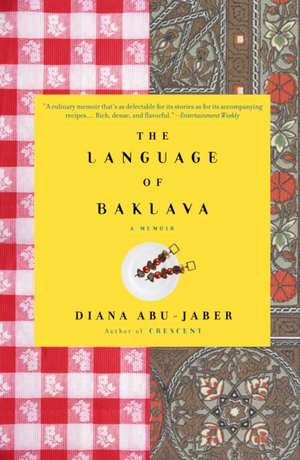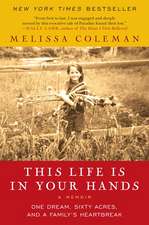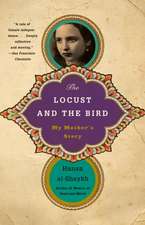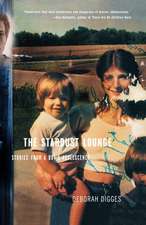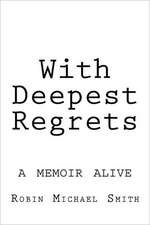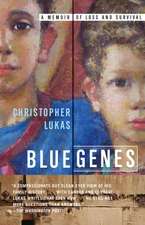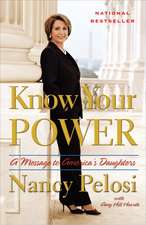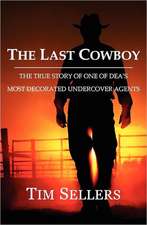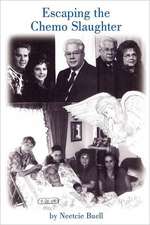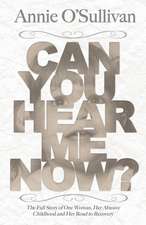The Language of Baklava
Autor Diana Abu-Jaberen Limba Engleză Paperback – 28 feb 2006
Vezi toate premiile Carte premiată
Preț: 122.86 lei
Nou
Puncte Express: 184
Preț estimativ în valută:
23.51€ • 24.63$ • 19.43£
23.51€ • 24.63$ • 19.43£
Carte tipărită la comandă
Livrare economică 11-25 aprilie
Preluare comenzi: 021 569.72.76
Specificații
ISBN-13: 9781400077762
ISBN-10: 1400077761
Pagini: 330
Dimensiuni: 137 x 202 x 20 mm
Greutate: 0.25 kg
Editura: Anchor Books
ISBN-10: 1400077761
Pagini: 330
Dimensiuni: 137 x 202 x 20 mm
Greutate: 0.25 kg
Editura: Anchor Books
Notă biografică
Diana Abu-Jaber is the author of Crescent, which was awarded the 2004 PEN Center USA Award for Literary Fiction and the Before Columbus Foundation’s American Book Award, and was named one of the twenty best novels of 2003 by The Christian Science Monitor. She is also the author of Arabian Jazz, which won the 1994 Oregon Book Award and was nominated for the PEN/Faulkner Award. She teaches at Portland State University and divides her time between Portland and Miami. Her website is www.dianaabujaber.com.
Extras
ONE
Raising an Arab Father in America
It's a murky, primordial sort of memory: a cavelike place, bright flickering lights, watery, dim echoes, sudden splashes of sounds, and--hulking and prehistoric--TV cameras zooming in on wheeled platforms. A grown man in a vampire costume clutching a microphone to his chest is making his way through rows of sugar-frenzied, laugh-crazed kids. He attempts to make small talk with the children through a set of plastic fangs. "Hello there, Bobby Smith!" He chortles and tousles a head. "How are you, Debbie Anderson!" I'm sitting in a television studio in a row full of cousins and sisters, not entirely sure how I got here--this was my aunt Peggy's idea. She'd watched The Baron DeMone Show for years and finally decided to send away for studio tickets.
He stalks closer and closer: I can see tiny seeds of sweat sparkling along his widow's peak. He squints at our oversize name tags: "Farouq, Ibtissam, Jaipur, Matussem . . ." I see his mouth working as he walks up our row of beaming, black-eyed kids. Eventually he gets to me. "Diana!" he cries with evident relief, then crashes into my last name. But apparently once this man starts going, he must see the thing through. He squints, trying to sound it out: "Ub-abb-yuh-yoo-jojee-buh-ha-ree-rah . . ." This guy's a scream! I can't stop laughing. What an idiot! I've got green eyes and pale skin, so evidently he feels I must speak English, unlike the rest of the row. He squats beside me, holds the big mike in my face, and says, "Now, Diana, tell me, what kind of a last name is that?"
This guy slays me! I can barely stop laughing enough to blast, "English, you silly!" into his microphone.
He jumps, my magnified voice a yowl through the studio, then starts laughing, too, and now we're both laughing, but at two different jokes--which must happen quite a bit on children's programming. He nods approvingly; they love me and my exotic entourage--later we'll be flooded with candy, passes, and invitations to return to the show. But at the moment, as the Baron stands to leave, I realize I'm not quite done with him yet. I grab him by the back of his black rayon cape and announce on national television, "I'm hungry!"
I'm six and I'm in charge; the sisters are just getting around to being born. Bud, my father, carries me slung over one shoulder when he cooks; he calls me his sack of potatoes. Mom protests, pointing out safety issues, but Bud says it's good for me, that it'll help me acclimate to onion fumes. I love the way his shoulder jumps and his whole back shakes as he tosses a panful of chopped tomatoes over the flames while the teeth rattle in my head.
My father is a sweet, clueless immigrant--practically still a boy. He keeps getting fooled. He saw TV for the first time when his boat stopped in Italy en route to Ellis Island. It was flickering in a hotel lobby. On the screen he saw a lady in a pretty blue dress singing to a cat dressed in a tuxedo. "Look at that," he marveled to his brother. "They've got a whole theater inside that box!" After he'd been in America a couple of months, a door-to-door salesman convinced him to spend three weeks of pay on a TV that didn't have any working parts. He told Bud it needed some time to "warm up." Bud hopefully switched it on and off for weeks before an American friend visited and explained that this TV would never be warm.
Bud learns English not from books, but from soaking in the language of work, of the shops and restaurants after he arrives in this country. I don't know where he learns how to hail strangers, but whenever my father needs directions--which is frequently--he flags down men and women alike with the same greeting: "Hey, bud!" I grow up thinking of all Americans as Bud--and even though my father's name is Ghassan Saleh Abu-Jaber, he becomes the original Bud.
I learn early: We are Arab at home and American in the streets. The streets are where Bud speaks English in a loud voice, swaggers, wears hard-soled shoes. Sometimes he slips and haggles with the clerk at Sears over the price of ties. He'll ask me in Arabic if I think the man is a big moron or just a little idiot. After considering my assessment, he'll formulate the appropriate bid--perhaps grudgingly offer to pay the price on the tag--minus two dollars! Plus an extra tie! Usually the clerk looks befuddled or calls for a manager, but every now and then, Bud'll find one who turns sharp-eyed and pleased, who throws out an unauthorized counteroffer--extra tie, but full price! Their voices flash in the flat mall light.
On Saturdays Bud is in the kitchen. The old houses along our elm-lined streets seem to sigh, screen doors ease open, the air sweetens, and the sky leans back on one elbow. First my father will make breakfast. After that, any one of a number of miraculous things can happen:
Go to Diplomat-Uncle Jack's house and have stuffed grape leaves.
Go to Professor-Uncle Hal's house and have kibbeh.
Go to Businessman-Uncle Danny's house and have stuffed squash.
Go to Crazy-Uncle Frankie's house and have roasted leg of lamb.
Go to Fair Haven Beach with everyone and have shish kabob.
Those aren't their real names: Uncle Hal is really Uncle Hilal, Jack is actually named Jaffer, Danny is Hamdan, and Frankie is short for Qadir. They are the uncles who, along with my father, came to America. Somehow, after they bought their new winter coats at Robert Hall in downtown Syracuse and changed the part in their hair, they all seemed to have new American names as well. Almost everyone I know has two names--one from Before and one from After. Even I have two names--for some reason, Bud calls me Ya Ba, which means "Little Daddy," but this name seems to belong between the two of us.
I love to be in the kitchen and watch my strong father at work in his undershirt, baggy shorts, and sandals. He's singing along with the radio and not getting a single word right. But what he lacks in accuracy he makes up for in gusto and verve. He slides a whole side of lamb out of the refrigerator, hoists it up for me and my friend Merilee to admire, and says, "Here he is! Here's Marvin." Bud likes to name all big cuts of meat--usually Tom, Dick, Harry, or Marvin. I stand close beside him, four feet high in flip-flops, bony shoulders poking through the crossed straps of my sundress, plastic heart-shaped sunglasses propped on my head, and watch as he centers the meat on his chopping block and whomps his cleaver down. My friend Merilee, with her freckles and straw yellow pigtails, shrieks and clatters out the back door. I happily tote the bloody kabobs from the block to the marinade of garlic, rosemary, vinegar, and olive oil. Bud tells me that someday I will make a fantastic butcher.
Next, Bud pushes the big, glistening chunks of beef and onion and tomato onto skewers. The skewers are iron, with round hoops at one end and cruel, three-sided points on the other, so heavy that once they're threaded with meat, I can carry only one at a time to the refrigerator.
Shish kabob means that there will be coolers and ice chests, blankets and salads, pita bread, iced tea, salty braided cheese, hummus, maybe a visit to Rudy's stand, where they dip the scoops of ice cream into a kind of chocolate that hardens into a shell. Maybe our mother will bring frozen pound cake, because who wants to bake anything in this heat?
There will also be sisters and cousins and aunties and uncles and even more cousins, because there's no telling who's just "comeover," meaning come over from the old country. You never know when suddenly a second cousin you haven't seen in years will be standing in the living room, asking for a little cup of coffee. They'll be hungry because everyone who "comesover" is hungry: for home, for family, for the old smells and touches and tastes. If we're not at the park, sometimes these cousins and noncousins and friends and strangers will drop by the house. Coincidentally, they always come at dinner-time. Always at the moment we turn on the stove.
Bud says that today we children need to be extra pleasant, polite, and cute. Today Cousin Sami (Samir) will be with us. He is newly arrived, twenty years old, sensitive, and willowy as a deer. He walks tentatively in this new country, looking around himself as if about to break into flight; his eyes glisten, eternally on the verge of tears. I overhear Bud telling Mom that he doesn't know if Sami will "make it." Mom blows a filament of hair out of her face; she's twenty-six years old and tall, but she doesn't have much more meat on her than I do. Her reading glasses are smart and serious. I can tell that she's thinking, What is it with these sensitive, crazy men?
We pack up the family and drive the road to the north, over tiny wooden bridges, past taverns with names like Three Rivers Inn and gurgling minute creeks, up to Fair Haven Beach on Lake Ontario, thirty miles from Syracuse. After we arrive and roll along behind people walking to their car in order to secure the best parking spot, it will take an even longer time to unpack the trunk and find the exact picnic tables and get out the bags and coolers and cousins and sisters. We cover several tables with red-checked tablecloths, paper plates, plastic containers full of everything. Bud piles briquettes into three different grills, and Uncle Hal adds more and more lighter fluid--usually while it's burning--so the flame roars right up at him in a fabulous arc. I draw in the rich chemical aroma: Barbecues are the smell of lighter fluid, dark and delicious as the aroma of gasoline.
Another car pulls up and there is Cousin Sami unfolding from Uncle Danny's Volkswagen. Sami holds out his hands as if testing the gravity on this new planet. He looks as if he might topple over at any moment. I adore him. Big, hearty Businessman-Uncle Danny, who's looking after him because his full-time father, Rich-Uncle Jimmy, lives in Jordan, laughs and calls him "a poet." I know immediately that's what I want to be, too, and I say this to my father as he's carrying a platter full of shish kabob. He looks unhappy at this news, but then Uncle Hal shouts, "Oh yes, there's a lot of money in that," and the adults laugh for inexplicable reasons and then forget about me.
The cousins--except for Sami--and sisters and I run in the frothy surf along Fair Haven's pebble beach. The water is electrically cold, threaded with mysteriously warm currents. We go in up to our necks and the waves lift us off our feet. We can do just this, standing in ice water and bobbing, for hours. A game for lunatics. We don't ever want to come in, even when our mother and one of the aunties wade out and says, "Your lips are purple, time to come in." First we make Mom demonstrate her ability to float in the water so that her shoulders submerge and her pink toes bob up and she looks as if she's sitting in a recliner. This, I assume, is a talent innate to all Americans. We all try, and our chicken-bone bodies just sink. Dad and his too many brothers don't even own bathing suits.
There's a commotion on shore. My father and the uncles are shouting and waving their arms: Shish kabob is ready! Uncle Hal is ferrying the sizzling skewers--we call them sheeshes--to a big platter on the table. Bud is turning more of them on the fire.
The shish kabob comes like an emergency. It sizzles at the table, and Uncle Hal pushes the chunks of meat off the skewers with a piece of pita bread. They all go to one central plate. He says, "This piece is for you and this one for you." It's best to wait for the second sheesh because for some reason the meat on the first always looks scrawny and shriveled and smells of uncooked lighter fluid. But there's no time to wait! You have to eat the lamb when it's hot enough to burn your fingers and scald your tongue.
"Eat it now," Uncle Hal says. "It's good right this second."
This is one of the secrets of shish kabob: how quickly it dries and hardens on the skewer. Not like a roast leg of lamb or breasts of chicken that fall off the bone when you cook them long and ruthlessly enough. Shish kabob is fierce. It comes charred and crusty outside and pink, almost wet red inside, richly redolent, in its special way, of marrow and pepper. It sizzles in your mouth and tastes faintly of the earth.
In the midst of all this drama and pageantry, however, I notice that Sami hasn't left his perch on the far end of the most distant picnic bench. His eyes are glowing as he watches us with both curiosity and aloofness. I pluck a morsel from the plate and run to him while it burns my fingertips. To my mind, this is the best way to show love--to offer food from your own hand. But he only closes his eyes and shakes his head dolefully.
Because I am six, I am typically the one being fed--I've never tried to feed anyone from my own hand like this before. But I've never had a cousin like this before. Usually my older Jordanian cousins arrive resplendent in polyester bell-bottom slacks--this being the late sixties--tall and strapping and hungry for America. With big mustaches, huge laughs, wild eyes, and big--very big--plans. Not Sami, though. Earlier that morning, Bud talked about it on the phone with one of his brothers. Sami didn't even want to come to America. In our family, we assume that everyone is simply dying to come here. It's like a law of nature: Grow up, go to America. I learn from sitting at the kitchen table, helping Bud poke kabobs onto skewers while he talks on the phone, that Uncle Jimmy sent Sami to America to "cure him" of something or other. When I ask Bud later what Uncle Jimmy wants to cure him of, he thinks about his answer for a while before he decides to say, "Of being a poet."
Raising an Arab Father in America
It's a murky, primordial sort of memory: a cavelike place, bright flickering lights, watery, dim echoes, sudden splashes of sounds, and--hulking and prehistoric--TV cameras zooming in on wheeled platforms. A grown man in a vampire costume clutching a microphone to his chest is making his way through rows of sugar-frenzied, laugh-crazed kids. He attempts to make small talk with the children through a set of plastic fangs. "Hello there, Bobby Smith!" He chortles and tousles a head. "How are you, Debbie Anderson!" I'm sitting in a television studio in a row full of cousins and sisters, not entirely sure how I got here--this was my aunt Peggy's idea. She'd watched The Baron DeMone Show for years and finally decided to send away for studio tickets.
He stalks closer and closer: I can see tiny seeds of sweat sparkling along his widow's peak. He squints at our oversize name tags: "Farouq, Ibtissam, Jaipur, Matussem . . ." I see his mouth working as he walks up our row of beaming, black-eyed kids. Eventually he gets to me. "Diana!" he cries with evident relief, then crashes into my last name. But apparently once this man starts going, he must see the thing through. He squints, trying to sound it out: "Ub-abb-yuh-yoo-jojee-buh-ha-ree-rah . . ." This guy's a scream! I can't stop laughing. What an idiot! I've got green eyes and pale skin, so evidently he feels I must speak English, unlike the rest of the row. He squats beside me, holds the big mike in my face, and says, "Now, Diana, tell me, what kind of a last name is that?"
This guy slays me! I can barely stop laughing enough to blast, "English, you silly!" into his microphone.
He jumps, my magnified voice a yowl through the studio, then starts laughing, too, and now we're both laughing, but at two different jokes--which must happen quite a bit on children's programming. He nods approvingly; they love me and my exotic entourage--later we'll be flooded with candy, passes, and invitations to return to the show. But at the moment, as the Baron stands to leave, I realize I'm not quite done with him yet. I grab him by the back of his black rayon cape and announce on national television, "I'm hungry!"
I'm six and I'm in charge; the sisters are just getting around to being born. Bud, my father, carries me slung over one shoulder when he cooks; he calls me his sack of potatoes. Mom protests, pointing out safety issues, but Bud says it's good for me, that it'll help me acclimate to onion fumes. I love the way his shoulder jumps and his whole back shakes as he tosses a panful of chopped tomatoes over the flames while the teeth rattle in my head.
My father is a sweet, clueless immigrant--practically still a boy. He keeps getting fooled. He saw TV for the first time when his boat stopped in Italy en route to Ellis Island. It was flickering in a hotel lobby. On the screen he saw a lady in a pretty blue dress singing to a cat dressed in a tuxedo. "Look at that," he marveled to his brother. "They've got a whole theater inside that box!" After he'd been in America a couple of months, a door-to-door salesman convinced him to spend three weeks of pay on a TV that didn't have any working parts. He told Bud it needed some time to "warm up." Bud hopefully switched it on and off for weeks before an American friend visited and explained that this TV would never be warm.
Bud learns English not from books, but from soaking in the language of work, of the shops and restaurants after he arrives in this country. I don't know where he learns how to hail strangers, but whenever my father needs directions--which is frequently--he flags down men and women alike with the same greeting: "Hey, bud!" I grow up thinking of all Americans as Bud--and even though my father's name is Ghassan Saleh Abu-Jaber, he becomes the original Bud.
I learn early: We are Arab at home and American in the streets. The streets are where Bud speaks English in a loud voice, swaggers, wears hard-soled shoes. Sometimes he slips and haggles with the clerk at Sears over the price of ties. He'll ask me in Arabic if I think the man is a big moron or just a little idiot. After considering my assessment, he'll formulate the appropriate bid--perhaps grudgingly offer to pay the price on the tag--minus two dollars! Plus an extra tie! Usually the clerk looks befuddled or calls for a manager, but every now and then, Bud'll find one who turns sharp-eyed and pleased, who throws out an unauthorized counteroffer--extra tie, but full price! Their voices flash in the flat mall light.
On Saturdays Bud is in the kitchen. The old houses along our elm-lined streets seem to sigh, screen doors ease open, the air sweetens, and the sky leans back on one elbow. First my father will make breakfast. After that, any one of a number of miraculous things can happen:
Go to Diplomat-Uncle Jack's house and have stuffed grape leaves.
Go to Professor-Uncle Hal's house and have kibbeh.
Go to Businessman-Uncle Danny's house and have stuffed squash.
Go to Crazy-Uncle Frankie's house and have roasted leg of lamb.
Go to Fair Haven Beach with everyone and have shish kabob.
Those aren't their real names: Uncle Hal is really Uncle Hilal, Jack is actually named Jaffer, Danny is Hamdan, and Frankie is short for Qadir. They are the uncles who, along with my father, came to America. Somehow, after they bought their new winter coats at Robert Hall in downtown Syracuse and changed the part in their hair, they all seemed to have new American names as well. Almost everyone I know has two names--one from Before and one from After. Even I have two names--for some reason, Bud calls me Ya Ba, which means "Little Daddy," but this name seems to belong between the two of us.
I love to be in the kitchen and watch my strong father at work in his undershirt, baggy shorts, and sandals. He's singing along with the radio and not getting a single word right. But what he lacks in accuracy he makes up for in gusto and verve. He slides a whole side of lamb out of the refrigerator, hoists it up for me and my friend Merilee to admire, and says, "Here he is! Here's Marvin." Bud likes to name all big cuts of meat--usually Tom, Dick, Harry, or Marvin. I stand close beside him, four feet high in flip-flops, bony shoulders poking through the crossed straps of my sundress, plastic heart-shaped sunglasses propped on my head, and watch as he centers the meat on his chopping block and whomps his cleaver down. My friend Merilee, with her freckles and straw yellow pigtails, shrieks and clatters out the back door. I happily tote the bloody kabobs from the block to the marinade of garlic, rosemary, vinegar, and olive oil. Bud tells me that someday I will make a fantastic butcher.
Next, Bud pushes the big, glistening chunks of beef and onion and tomato onto skewers. The skewers are iron, with round hoops at one end and cruel, three-sided points on the other, so heavy that once they're threaded with meat, I can carry only one at a time to the refrigerator.
Shish kabob means that there will be coolers and ice chests, blankets and salads, pita bread, iced tea, salty braided cheese, hummus, maybe a visit to Rudy's stand, where they dip the scoops of ice cream into a kind of chocolate that hardens into a shell. Maybe our mother will bring frozen pound cake, because who wants to bake anything in this heat?
There will also be sisters and cousins and aunties and uncles and even more cousins, because there's no telling who's just "comeover," meaning come over from the old country. You never know when suddenly a second cousin you haven't seen in years will be standing in the living room, asking for a little cup of coffee. They'll be hungry because everyone who "comesover" is hungry: for home, for family, for the old smells and touches and tastes. If we're not at the park, sometimes these cousins and noncousins and friends and strangers will drop by the house. Coincidentally, they always come at dinner-time. Always at the moment we turn on the stove.
Bud says that today we children need to be extra pleasant, polite, and cute. Today Cousin Sami (Samir) will be with us. He is newly arrived, twenty years old, sensitive, and willowy as a deer. He walks tentatively in this new country, looking around himself as if about to break into flight; his eyes glisten, eternally on the verge of tears. I overhear Bud telling Mom that he doesn't know if Sami will "make it." Mom blows a filament of hair out of her face; she's twenty-six years old and tall, but she doesn't have much more meat on her than I do. Her reading glasses are smart and serious. I can tell that she's thinking, What is it with these sensitive, crazy men?
We pack up the family and drive the road to the north, over tiny wooden bridges, past taverns with names like Three Rivers Inn and gurgling minute creeks, up to Fair Haven Beach on Lake Ontario, thirty miles from Syracuse. After we arrive and roll along behind people walking to their car in order to secure the best parking spot, it will take an even longer time to unpack the trunk and find the exact picnic tables and get out the bags and coolers and cousins and sisters. We cover several tables with red-checked tablecloths, paper plates, plastic containers full of everything. Bud piles briquettes into three different grills, and Uncle Hal adds more and more lighter fluid--usually while it's burning--so the flame roars right up at him in a fabulous arc. I draw in the rich chemical aroma: Barbecues are the smell of lighter fluid, dark and delicious as the aroma of gasoline.
Another car pulls up and there is Cousin Sami unfolding from Uncle Danny's Volkswagen. Sami holds out his hands as if testing the gravity on this new planet. He looks as if he might topple over at any moment. I adore him. Big, hearty Businessman-Uncle Danny, who's looking after him because his full-time father, Rich-Uncle Jimmy, lives in Jordan, laughs and calls him "a poet." I know immediately that's what I want to be, too, and I say this to my father as he's carrying a platter full of shish kabob. He looks unhappy at this news, but then Uncle Hal shouts, "Oh yes, there's a lot of money in that," and the adults laugh for inexplicable reasons and then forget about me.
The cousins--except for Sami--and sisters and I run in the frothy surf along Fair Haven's pebble beach. The water is electrically cold, threaded with mysteriously warm currents. We go in up to our necks and the waves lift us off our feet. We can do just this, standing in ice water and bobbing, for hours. A game for lunatics. We don't ever want to come in, even when our mother and one of the aunties wade out and says, "Your lips are purple, time to come in." First we make Mom demonstrate her ability to float in the water so that her shoulders submerge and her pink toes bob up and she looks as if she's sitting in a recliner. This, I assume, is a talent innate to all Americans. We all try, and our chicken-bone bodies just sink. Dad and his too many brothers don't even own bathing suits.
There's a commotion on shore. My father and the uncles are shouting and waving their arms: Shish kabob is ready! Uncle Hal is ferrying the sizzling skewers--we call them sheeshes--to a big platter on the table. Bud is turning more of them on the fire.
The shish kabob comes like an emergency. It sizzles at the table, and Uncle Hal pushes the chunks of meat off the skewers with a piece of pita bread. They all go to one central plate. He says, "This piece is for you and this one for you." It's best to wait for the second sheesh because for some reason the meat on the first always looks scrawny and shriveled and smells of uncooked lighter fluid. But there's no time to wait! You have to eat the lamb when it's hot enough to burn your fingers and scald your tongue.
"Eat it now," Uncle Hal says. "It's good right this second."
This is one of the secrets of shish kabob: how quickly it dries and hardens on the skewer. Not like a roast leg of lamb or breasts of chicken that fall off the bone when you cook them long and ruthlessly enough. Shish kabob is fierce. It comes charred and crusty outside and pink, almost wet red inside, richly redolent, in its special way, of marrow and pepper. It sizzles in your mouth and tastes faintly of the earth.
In the midst of all this drama and pageantry, however, I notice that Sami hasn't left his perch on the far end of the most distant picnic bench. His eyes are glowing as he watches us with both curiosity and aloofness. I pluck a morsel from the plate and run to him while it burns my fingertips. To my mind, this is the best way to show love--to offer food from your own hand. But he only closes his eyes and shakes his head dolefully.
Because I am six, I am typically the one being fed--I've never tried to feed anyone from my own hand like this before. But I've never had a cousin like this before. Usually my older Jordanian cousins arrive resplendent in polyester bell-bottom slacks--this being the late sixties--tall and strapping and hungry for America. With big mustaches, huge laughs, wild eyes, and big--very big--plans. Not Sami, though. Earlier that morning, Bud talked about it on the phone with one of his brothers. Sami didn't even want to come to America. In our family, we assume that everyone is simply dying to come here. It's like a law of nature: Grow up, go to America. I learn from sitting at the kitchen table, helping Bud poke kabobs onto skewers while he talks on the phone, that Uncle Jimmy sent Sami to America to "cure him" of something or other. When I ask Bud later what Uncle Jimmy wants to cure him of, he thinks about his answer for a while before he decides to say, "Of being a poet."
Recenzii
"A culinary memoir that's as delectable for its stories as for its accompanying recipes. . . . Rich, dense, and flavorful" —Entertainment Weekly
"Wonderful, touching and funny. . . . Honest and precise. . . . Abu-Jaber explores [her cultural] duality with a generous spirit and clear-eyed vision. . . . A lush and lyrical memoir." —The Miami Herald
"Incredibly powerful. . . . The world described is so strange and sumptuous, the characters so large and comedic, and the descriptions of the food so enveloping and mouthwatering that you want to climb into this world and make it your own." —The Oregonian
"Exquisite. . . . With humor and grace, the author explores timeless topics of love, cultural adjustments and what being rootless means. . . . [Abu-Jaber] takes us on an insightful journey. . .we ought not to miss."
—The Seattle Times
"Truly charming. . . . A fascinating memoir of confused exile, great food, and home truths."
—O, The Oprah Magazine
"Wonderful, touching and funny. . . . Honest and precise. . . . Abu-Jaber explores [her cultural] duality with a generous spirit and clear-eyed vision. . . . A lush and lyrical memoir." —The Miami Herald
"Incredibly powerful. . . . The world described is so strange and sumptuous, the characters so large and comedic, and the descriptions of the food so enveloping and mouthwatering that you want to climb into this world and make it your own." —The Oregonian
"Exquisite. . . . With humor and grace, the author explores timeless topics of love, cultural adjustments and what being rootless means. . . . [Abu-Jaber] takes us on an insightful journey. . .we ought not to miss."
—The Seattle Times
"Truly charming. . . . A fascinating memoir of confused exile, great food, and home truths."
—O, The Oprah Magazine
Descriere
Abu-Jaber's early life seemed defined by the rites and rituals of cooking andeating and she weaves her charming story around vividly remembered, sensuallydescribed meals.
Premii
- Oregon Book Awards Nominee, 2005
- Pacific Northwest Booksellers Association Award Winner, 2006
